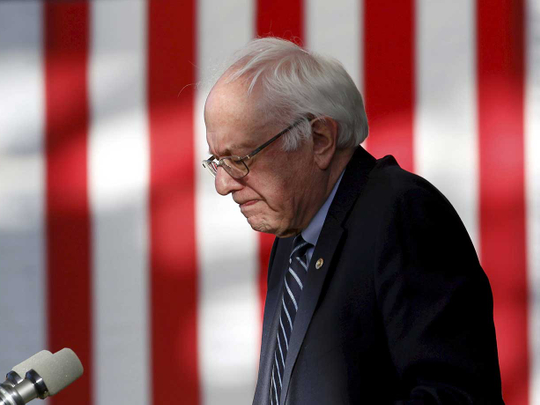
Hillary Clinton’s team just breathed a big sigh of relief on Saturday night after a decisive — if not by a wide margin — win in the Nevada Democratic caucus. Sure, she may technically have won in Iowa, but she won by a hair when she was expected to do so by a mile, and her victory speech then sounded a bit more like a grim defeat than a celebration.
So Nevada marked Clinton’s first unabashed victory speech, as she and her supporters celebrated her trademark ability to come from behind (or, at least, keep fighting).
“Some may have doubted us, but we never doubted each other,” she told the crowd in Nevada after being introduced by her teary-eyed state director. “This one’s for you.”
Being the underdog is a position from which Clinton shines, which may be the silver lining to the near-tie in Iowa and the loss in New Hampshire. The challenge that Sanders posed early on transformed her from the inevitable dynasty candidate to the one fighting for electoral relevance. And if Saturday is a lesson to anyone, it’s to Sanders’ camp: one should never underestimate either Clinton’s resilience or her attractiveness to voters when she’s able to play defence (despite remaining the party’s most likely nominee).
In her speech, Clinton explicitly addressed young voters — the group she’s most struggled to win away from Sanders — telling them her vision for helping them with regard to college debt. But then she pivoted somewhere unexpected: “It can’t be about what we’re going to give to you. It has to be about what we’re going to build together.”
The remark was an allusion to the notion that Sanders has promised things to young people — like free college and a tremendous political revolution — that he won’t ultimately be able to deliver. At other points in her speech, Clinton addressed the feasibility of Sanders’ plans more directly: “Americans are right to angry but we’re also hungry for real solutions,” she said, going on to argue (for example) that getting dark money out of politics could be as simply establishmentarian — an insult lobbed at Clinton by Sanders supporters — in approach as appointing a new justice to the US supreme court to overturn the Citizens United decision if the court ever has the opportunity to hear a related case.
“The truth is: we aren’t a single issue country,” she continued in a not-so-subtle jab at Sanders’s main policy platform. “We need more than a plan for the big banks.”
Before Clinton spoke, Sanders used a pre-speech concession statement, somewhat predictably, to frame his loss as a win — after all, the media framed his Iowa loss as a win. But that “win” was awarded on the basis of defying all expectations (and polling) with a virtual tie. In Nevada, having lost his last best chance to show that he can win over a majority of non-white voters, he’s going to have a harder time selling his loss as anything but a loss.
Still, he used his concession speech to make that precise case: “Five weeks ago, we were 25 points down” he said. “We’ve made some real progress.” His fans were receptive to optimism (and a speech that probably closely resembled the one he would’ve given had he won): he took the stage to cheers and usual shouts of “Bernie!”
But don’t be fooled: Sanders’ path to ultimate victory is narrower than it was on Friday, and the next primary is in South Carolina, where he’s expected to lose. After that, it’s onto a Southern state-heavy Super Tuesday on March 1, and Clinton is expected to outperform him then in states like Texas and Georgia with large delegate counts.
Sander’s didn’t acknowledge the coming long odds, though, and instead reached back into the past (again) to recast the present. “We have come a very long way in nine months” Sanders said. “It is very clear to me and I think most observers that the wind is at our backs. We have the momentum. And I believe that when Democrats assemble in Philadelphia in July at that convention we are going to see the results of one of the great political upsets in the history of the United States.”
That Pollyanna-ish read of his prospects skips conveniently over the likelihood that he’ll continue to struggle to appeal to African American voters, who make up a heavy proportion of Democratic voters in many of the states to come. After expending considerable energy on appealing to non-white voters in Nevada, and with political winds in his favour after New Hampshire, being unable to win over a majority of those voters in the American West cannot truly bode well for him in the American South.
Sanders will certainly win in Vermont and perhaps some other states on Super Tuesday and beyond, especially with his appeal to youth and passion. But right now he’s only 1-2 on states and behind in the delegate count (not even counting superdelegates), and he’ll need to win in more than a handful of big states and Southern ones to reverse his fortunes. Fresh off a loss in Nevada, it doesn’t look good for him.
It is true, as he noted in his speech, that when the race began he was down by around 50 points in Iowa and 30 points in New Hampshire. But surpassing expectations does not a nominee make; winning does. He probably won’t get a win in South Carolina; after that, he’s only got a week to pull out wins in more states in one day than have voted in one month to be able to keep claiming the mantel of “momentum”.
— Guardian News & Media Ltd
Lucia Graves is a Guardian US columnist. She was previously a staff correspondent for National Journal magazine and a staff reporter at Huffington Post.









